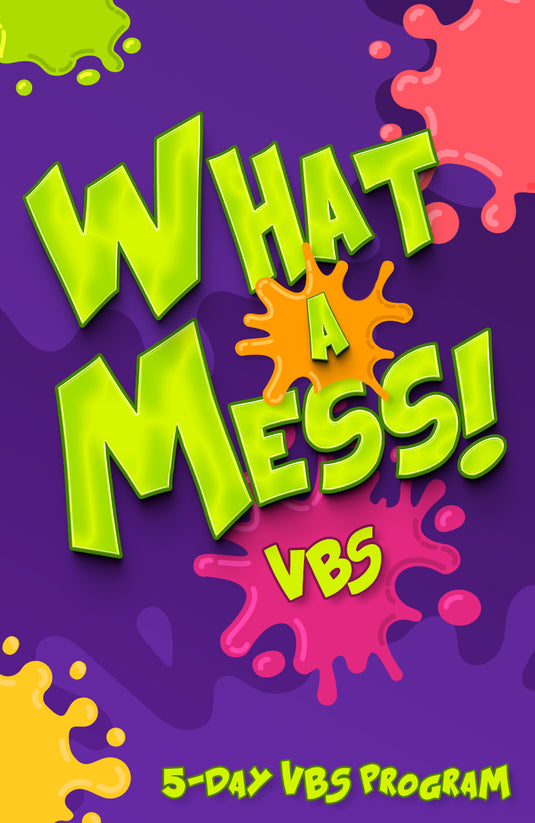Discover the best VBS games for every age group! Learn how to select age-appropriate activities to engage kids and make your Vacation Bible School unforgettable. Next time VBS rolls around, you can be ready with these helpful tips!
Table of contents
The Importance of VBS Games
A valuable part of Vacation Bible School is the games! Games get kids involved in hands-on participation and help bring a lesson to life. VBS games make things fun and allow kids to get up and move. Today, we will learn how to pick games that are appropriate for each group's developmental stage, how to adjust activities to meet the needs of each age group, and how to modify activities for mixed-aged groups while balancing a fun environment with a safe one.
VBS Games for Every Age Group
Choosing games based on what age group we will be teaching is a good place to start.
Preschool Games
Preschool kids benefit from simple and fun games. These activities require minimal instructions and can be easily adapted to fit your current lesson. For example, if your VBS program is Puzzling Pyramids VBS, you can adapt Duck, Duck, Goose into the Puzzling Pyramid characters Lyle, Della, and Cairo. Keep the same rules, but use the biblical characters' names. If your theme is Camp Chaos VBS, play Hot Potato with a stuffed toy squirrel!
Elementary Games
While younger kids are still figuring out how to follow instructions, older kids can begin to work on their team-building skills. Games for early elementary-age kids (K-2nd grade) are often more involved, while the instructions are not too complicated. Great ideas for this age group are relay races and follow-the-leader games.
Late elementary-age kids (3rd-5th grade) typically enjoy games divided into teams. Some good examples include Capture the Flag, dodgeball, and games that involve working together to solve a problem, like a scavenger hunt.
Adjusting VBS Games for Various Ages
When creating our own VBS or purchasing one already written, we can simplify things by choosing the same game for each age group and adjusting the game so each group has a slightly different version. Let's look at how we can adapt one game for each of our three major age groups.
Jonah and the Whale Parachute Game
A benefit of using the same game for each age group is that it allows for easier preparation in gathering supplies. It simplifies things by giving all the kids a similar experience. Modifications to the games are beneficial for the teachers and valuable for the students. While competition may be too overwhelming or upsetting to preschoolers, the 3rd through 5th graders might find the preschool version of the game boring.
Let's say your VBS program covers the story of Jonah and the Whale. We can quickly adapt a simple parachute game for each age group:
How to Play with Preschool Kids
Supplies
- Parachute
Gather children around the parachute. Instruct the kids to grab onto the parachute and raise it into the air. Call out a color. Anyone wearing that color shirt will run under the parachute (into the belly of the whale) and sit down. Then, everyone still holding the parachute will bring it down to the ground and sit on the edge. On the count of 3, the kids will lift it back up, and everyone will run out of the belly of the whale onto dry land again!
Play several rounds so that all the kids get a chance to go into the belly of the whale.
How to Play with Early Elementary Age (K-2nd) Kids
Supplies
- Parachute
- Balls of various sizes and types
Follow the same instructions we gave our preschool students, but this time, involve the kids by asking for a volunteer to pick a color for each round.
At the end of the game, toss some balls onto the parachute as "fish food" and give kids a chance to bounce the balls to feed the whale!
How to Play with Late Elementary Age (3rd-5th) Kids
Supplies
- Parachute
- Balls of various sizes and types
Divide the kids into two teams. Give each team a parachute. To add a challenge to the game, place the same number of balls on top of the parachutes.
Whichever team can most carefully bounce their balls and lose the least amount in one minute wins that round. That winning team gets to run over to the other team's parachute and take their place, holding onto it. The losing team will have to go under their parachute and get swallowed by the whale as the other winning team lifts it into the air and pulls it down to the ground. On the count of 3, they will lift it and free the losing team from the belly of the whale. Play several rounds!
Modifications to VBS Games in Mixed-Aged Groups
Mixed-aged groups can be challenging when planning VBS. For small-sized churches, in particular, mixed-aged is often our only option. Modifying games so they are appropriate for all ages is crucial to the success of your Vacation Bible School.
Here are some VBS game ideas for a group of various ages!
Simon Says
Say "Simon Says" and call out instructions for kids to follow. Call out instructions without saying "Simon Says" to see if you can catch kids doing it when they aren't supposed to!
Line Up!
Divide kids into groups of 6 or 7. They must line up quickly into specific orders that you call out. Start simple by having kids line up shortest to tallest or oldest to youngest. Whichever team successfully lines up correctly wins the round.
Increase the game's difficulty while also encouraging the kids to work as a team by having them line up in other ways, too:
- Alphabetically by Name (Ascending or descending!)
- By Birthday Month (January-December)
- Bedtime (Earliest to Latest)
- Number of Siblings
- Grade in School
- How Many Baby Teeth Lost
- Hair Length
- Shoe Size
- Alphabetically by Favorite Color
- Etc.
This is an excellent game for older kids to help younger kids and to get to know mixed ages.
Where Do You Stand?
Have kids go to one side of the room. Ask them which is their favorite, cats or dogs? If they love dogs the most, have them run to the other side of the room; if they love cats, have them say where they are.
Ask kids to pick their other favorites from other paired items. Every time you call out two things, kids will run to one side or the other, depending on their favorite.
Suggested Pairs
- Cats or Dogs?
- Superheroes or Princesses?
- Pirates or Ninjas?
- Socks or Bare Feet?
- Math or English?
- Recess or Lunch?
- Football or Baseball?
- Summer or Winter?
- Rain or Snow?
- Sweet or Salty?
- Cereal or Toast?
- Ice Cream or Cake?
- Pizza or Tacos?
- Apples or Bananas?
This is a fun icebreaker game that gets kids moving.
Sponge and Bucket Game
Divide kids into two teams and see which team can pass their sponge down the line to fill their bucket the fastest.
Supplies
- Buckets
- Sponges
- Water
- Towels for cleanup
Begin with a full bucket at the beginning of the line and an empty bucket at the end of the line. Once the sponge is passed down the line of kids and squeezed into the bucket, the last kid will have to run to the front of the line to fill the sponge and pass it down the line again.
This game is suitable for all ages, so be sure to mix the teams up so that there is an equal number of players from each age group.
Chariot Race
One creative game idea that gets older kids to help younger children and encourages younger children to participate is called Chariot Race! Pair up Big Kids (3rd to 5th grade) with Little Kids (Preschool/K to 2nd grade). Each Big Kid will get on their hands and knees. The Little Kid will ride on their back. Begin at one side of the room and have the teams crawl to the other end to see which pair wins the race.
Important Things to Remember When Playing Games With Mixed-Age Groups
- Explain directions clearly and repeatedly: For more complex games, go over the rules several times to ensure all kids understand how to play.
- Choose team-based games: Opt for games in which students work together in groups. This encourages collaboration and helps balance skill levels.
- Avoid competitive solo games: Avoid games like Red Light Green Light, where individual competition may pit older kids against much younger ones.
- Skip high-impact physical games: Games like tag or dodgeball may cause younger children to be pushed, knocked over, or hit, which poses safety concerns.
- Prioritize fun and safety: Always aim for activities that are both enjoyable and safe for everyone, regardless of age.
Whether we are writing our games, modifying prewritten games, separating kids by age group, or combining mixed-aged groups, there is always a way to make games fun, safe, and memorable for everyone! Each age group is unique in their abilities and needs. We can take our knowledge of these needs and provide a way for all the kids to join in the fun. We can also make adjustments so that every group can play a similar version of the same game. Let's get out there, have fun together, and play safely!
Was this article helpful? You might also enjoy:






